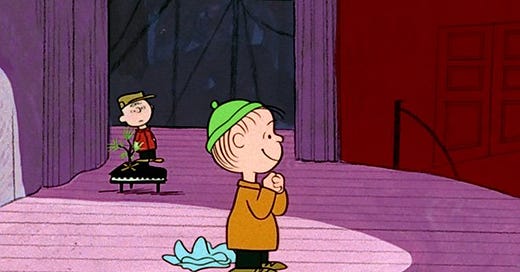And there were in the same country shepherds abiding in the field, keeping watch over their flock by night.
And, lo, the angel of the Lord came upon them, and the glory of the Lord shone round about them: and they were sore afraid.
And the angel said unto them, Fear not: for, behold, I bring you good tidings of great joy, which shall be to all people.
For unto you is born this day in the city of David a Saviour, which is Christ the Lord.
And this shall be a sign unto you; Ye shall find the babe wrapped in swaddling clothes, lying in a manger.
And suddenly there was with the angel a multitude of the heavenly host praising God, and saying,
Glory to God in the highest, and on earth peace, good will toward men.
—Luke 2:8-14
Every time I read this passage, two things happen. First, I hear it in Linus’ charming little-kid voice, which is perhaps the best way to hear this verse. Second, I get chills.
I was just a little kid, myself, the first time I heard this passage. Growing up in the 1970s and 1980s, watching A Charlie Brown Christmas was an annual ritual. Mom would set me and my brother in front of the TV, and for thirty glorious minutes we watched Charlie Brown go from failure and dejection to rapturous joy.
Growing up with zero religion, we understood almost none of Linus’ speech, but it was still somehow magical. We knew we were being told that there was much more to Christmas than parties, decorations, and presents, but we didn’t know what it was. It felt like there was an otherworldly aspect to Christmas that added dimension and weight to it like no other holiday, but its source was a mystery to us. I certainly had no idea that three decades later its source would become the central theme of both of our adults lives.
A few years ago, I read a biography of Charles Schulz. He grew up Christian, and took his faith seriously. His withering commentary on what he saw as the cruel unfairness of Santa Claus—who, as he pointed out, is generous with wealthy children and miserly with poor children—was allegorically expressed in the Charlie Brown Halloween special, of all places. He had other plans for the Christmas special. When the television network wanted to excise Linus’ religious speech from the movie, he fought to keep it in. He made it such a fundamental part of the story that it would’ve been impossible to cut it out. And thank God he did. I have no doubt it planted a seed with many children of my generation, including me and my brother.
There were wonderful touches that helped make A Charlie Brown Christmas land with kids. The simple, hand-drawn aesthetic of the animation is charming, but it also creates enough distance from the darkness of Charlie Brown’s seasonal depression to make it relatable to kids but not too real. Casting child voice actors in the roles lent an authenticity to the story that would have otherwise been lost with adult actors pretending to be children. And it was a stroke of genius to have jazz pianist Vince Guaraldi arrange the timeless soundtrack for the show. The result was near-perfection.
I could watch that scene every day of my life and never get tired of it.
There is no other holiday like Christmas. Even Easter, which perhaps ought to figure more prominently in the average Christian’s year, is down the list from Christmas. Personally, I think it’s the sense of imminence. The deathlike sleep of the world during darkest winter (at least, for those of us in the northern hemisphere) mirroring the death and darkness of a fallen world. A world seemingly without hope, desperate for a Savior. And then Hope enters the world. Our Savior arrives.
I love beginnings in stories, but my favorite part of a story is the beginning of the second act, and that is exactly what the story of Christmas is. It is the first dawn, a foretaste of the dramatic dawn of the final act. Regardless of what’s going on, we do not need to fear, because He is with us.
I wish you all the very merriest of Christmases.






Another TV special that is well worth watching is the original animated How the Grinch Stole Christmas. The Grinch thinks that if he steals all the Christmas presents, he will have succeeded in stealing Christmas. He finds out otherwise. In the end he understands, and he celebrates the meaning of Christmas along with all the others.
Originally by Dr. Seuss, the story 'reminds' kids that it's not all about the presents.
Merry Christmas to all.